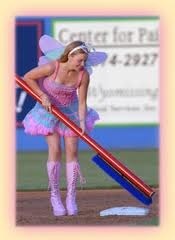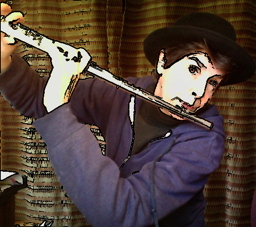Sue Lange's Blog, page 10
June 26, 2013
Playwriting as Religious Experience
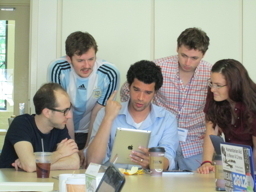
l to r: MFA, intern, teacher, intern, intern
Maybe it was just the time away from the computer but I feel cleansed and whole again. Like I’d been down to the river or something.
There was no rolling on the floor, lifting up of eyes, or frothing at the mouth, but in the end I can say the Kenyon playwrights conference was nothing short of a religious experience. I came away refreshed of spirit and with my faith in the muse renewed. Coming home I dedicated my life to the higher power of a nicely written conflict. I’m telling you, man, I am totally saved.
Maybe it was just the joy I experienced roiling in all that Midwestern optimism. Your sardonic sense of things retreats to the background as you bask in the innocence of a small, well-kept college town like Gambier, Ohio. Or, rather, bumphrak, Ohio as I lovingly call it. Considering I live in bumphrak, PA, I wouldn’t have thought farm air and a generally neat countryside would have provided much change, but it is different there. Imagine Berks County without the hills. In addition Gambier has the primness you usually find around places like Devon and Winterthur where even the weeds are manicured to perfection. You get the picture. It was lovely there and it went on and on and on, all the way to the horizon.
And what was I doing there? I mean besides drinking, carousing, and annoying the neighbors, which is expected of anyone attending a conference of any kind be it plumbing, Democrating, or vampiring. The type of thing that always happens whenever you get a group of people with a common interest together and send them off without their spouses. We held our own and proudly kept the reputation of writers being alcoholics intact. We carried on the Great Tradition with aplomb. And that surprised me. I think of playwrights as being intellectual and superior and staid and with families. They have names like August and William and Lillian. They’re not poets for chrissake. They write dialog, the very height of connection between people. They don’t need their Jones, because theater is a collaborative art, and so its creators are in touch, not isolated. They don’t hang about in garrets or clouds. They’re on porches and railroad platforms. There’s no reason for the mood altering chemicals. And yet, and yet, there is Eugene, Tennessee, Arthur. So the tradition exists and we held our own at the bar. Pretty much every night.
During the day activity centered around the play, which is the thing, as everyone knows. Not just the play, but the Great American Play. That is to say, our own. Each and every single one of us was working on the Great American Play. We slaved over next year’s Obie, Tony, and Pulitzer winning work. Each of us. We wrote and sweated and presented. We worried and cried and wrung our hands. In all fairness, the latter was probably due to the cafeteria running out of bananas and yogurt, forcing us to eat a sausage sandwich for lunch, but really, we did worry over our plots much of the time.
We critiqued our classmates and in turn were critiqued by them. We discovered our weaknesses and returned to the drawing board, or perhaps the Village Inn. We downed another cup of coffee, rinsed and repeated. We suffered the slings and arrows of the ill-tempered artistic directors posing as our teachers. We deflected the disdain of the interns forced to read our lines before they were allowed to graduate. We withstood the sneers of the MFAs assigned to our classes. Oh those haughty MFAs with their diplomas and credentials and effing talent. How many lunches didn’t we skip to slave over our plots just to show those damn MFAs!
We clung to our shredded pride, vowing to never be hungry again. In the end, we improved. Maybe not a lot, but a little. Enough to stay in the game, to convince ourselves we can do this. We can write a plausible inciting incident. At night, alone in our dorm rooms with the lights out and no one around to keep us down to Earth, we dreamed of having our work, eek! produced one day.
And there’s the rub. The dream di tutti dreams: a full production with actors and a paid director at somebody else’s house besides our own. Because remember how we got started was in our own little theater at our own little house. Well, our parents’ actually.
When we were little the world was still filled with possibilities. We were precocious and creative and had the can-do spirit not yet knocked out of us. So we clothing-pinned an army blanket to a rope strung from the top of the window to the top of the book case. The blanket might have had a hole in it that our overactive imaginations believed to be a bullet hole. In truth our fathers never saw any action and the hole was from a moth, but never you mind. We were young and full of possibilities. And we were the writers, directors, and producers of our very first plays. We even starred in them. We now know the star properly as the “protagonist.” We learned that in Ohio. Back then, though, we were simply the most important person on the stage. Perhaps in the world. The story was about us, of course. And maybe the zebras in the zoo. Or the monkeys. Always the monkeys. In the real world the monkeys are the protagonist and we the antagonist but that’s real life. Over in the reptile house was our first conflict, but we didn’t notice the creaking open door to the python cage. We do now, of course, having been to the Kenyon playwriting conference. It’s in there now, yessirree bob: that ratcheting tension and overwrought complication. But back then it was just a zebra and a monkey and an army blanket with a hole: a zoo story without a suicide. And now look at us: able to write conflict and tactics and tension. Don’t we clean up nice!
Yes, I’ve been down to the river and have been set free. Hallelujah!

inside the tree of wishes


June 20, 2013
Rootin’ for the Home Team
The Reading Fightin’ Phils’ tooth fairy
It’s the top of the seventh—time for the stretch. Everybody stand and sing along.
Take me out to the ball game.
Take me out to the park.
Buy me peanuts and popcorn and cracker jacks.
I don’t care if I ever come back.
So it’s root, root, root for the …
Er…
“Fightin’ Phils?”
Really?
Who thought up that name? Who vetted this? Did they not notice it doesn’t fit in The Song? And by the by, what happened to “Phillies?”
We understand we’re not the only farm team for the big guys, the real Phillies in Philadelphia. Yet and still, the Reading Phillies were garnering a lot of regional pride for the, uh, region, and c’mon, the Fightin’ Phils? Really?
Who the eff is Phil and why is he plural? And if we’re not being rhythmically correct, why not Fighting Phillips? Make a day of it.
Such thoughts went through the minds of those in the cheap seats the moment they discovered the name change. The season ticket holders, them that sit in the green and blue sections, of course, were hip to the whole affect much earlier in the season. Took it all in stride. They were well aware of the name change and the cognitive dissonance that unfolds in the seventh inning stretch. They’d not only gotten the memo, they were probably in on the decision. The minor league ball clubs go to great lengths to get meat in the seats. The best way is to get as many people as possible involved in the effort. No doubt they let the diehard fans help out with logistics and decision-making. Thanks a lot folks.
There are weirder things that minor league clubs do to get fans out. Since a game is not enough to get us to come out and support the team, they provide added entertainment on game day. There’s all kinds of wacky hi jinx going on between innings. Minor league baseball isn’t so much a sporting event as it is a circus, complete with the modern equivalent of clown cars, freak shows, and cheap carny prizes. The Reading Fightin’ Phil’s version comes with the Crazy Hot Dog Vendor, t-shirt shooting gun, t-shirt slingshots, family feud with t-shirts as prizes, the tooth fairy who wears bodacious platform boots and cleans off the bases between innings, and some guy who invented a dance called the Brisco Disco.
When enthusiasm flags, they stop the game and bring out a couple of church groups to compete against each other for prizes donated by local businesses. Cases of sausages or a session with a local tanning salon, that sort of thing. This gets local folks as well as local businesses involved in the games. The contests are bizarre and are only weakly related to baseball. Two years ago my friend Liz won the basesball poetry contest and got to read her winning baseball poem to the appreciative fans. Never knew there was a whole sub-genre of poetry dealing only with baseball did you? Look for it in Barnes & Noble.
And the games are themed. For the latest game I attended, the theme had something to do with getting kids to read. The pregame show included a rendition of the Crazy Hot Dog Vendor reading Green Eggs and Ham to a crowd of parents and children out on what they call the promenade at the stadium, but everywhere else would be called the food court. The choice of Sam I Am for reading was ironic considering the team’s name change. I mean here’s a story by Dr. Seuss, a writer who couldn’t write without rhythm and rhyme to save his life and then there’s this desecration of The Song’s meter perpetrated by the Reading ball club management (with the help of the season ticket holders, of course).
Anyway, those of us in the cheap seats, attending only one or two games every decade, hadn’t gotten the memo and were not privy to the new shit. The name change took us totally by surprise.
We laughed and joked about it as consumers of cheap seats are prone to do when faced with an inscrutable situation. We imagined perhaps the Lehigh Ironpigs or the Williamsport Crosscutters–also farm teams for the Phillies–got pissed because we took the titular title. They whined to management. Or maybe the real Phillies got pissed because our crowd was growing. More and more people were coming out to do the Brisco Disco. Maybe they got jealous. None of their fans make asses of themselves in that way. Why should we get all the fun stuff and the team name?
Or maybe, we joked, somebody from the Philadelphia Phillies actually witnessed our boys playing and thought they’d like to distance themselves as much as possible. Based on the current game, we joked, that was definitely plausible.
We had a good ol’ time up in the cheap seats, all at the expense of the Fightin’ Phils management, or owners, or season ticket holders, or whoever decided on the new name’s, expense.
Then things got ugly. We hit the seventh inning stretch and couldn’t figure out how to sing The Song. Now we were shamed. Now it was personal. We were unable to scream out the name of our team when root, root, rooting. We were relegated to using the generic “home team.” No good. We’re the home team, sure, but we want to be the Fightin’ something or others. It was the equivalent of being shunted to the back of the bus on the way to the home for foundlings. We were orphaned while taken for a ride.
Root, root, rooting for the home team doesn’t do it. In Wrigley Field they root, root, root for the Cubbies. In New York they root, root, root for the Yankees. In Reading we root, root, root for god knows who. We are a motherless child.
The Song wound down. We lost the game in the rhythmic dissonance of a badly chosen name.
“Guess we ought to head out, beat the crowd,” Liz said. She was the driver, therefore it fell on her shoulders to state the obvious: the fun was over, The Song didn’t work. No amount of Crazy Hot Dog Vending, or tooth fairying, or t-shirt cannoning could save the day.
We trudged out with the other dejected cheap seat ticket holders.
We’ll never root, root, root for anybody ever again. How can we? We’ve lost our connection to our team. Maybe the Reading ballclub management will reconsider. Maybe they’ll start a search for a new name. I don’t know. Almost anything would be better than the Fightin’ Phils. Even the “Pirates.”
The cheap seats

The blue and green sections


June 11, 2013
Up to the Country in Berks County, PA
 On January 31, 2001 I slept on a threadbare carpet in an empty second floor room of what most people would think was a haunted house. There were noises in the night, damp drafts, mice scratching in the walls and attic. Lights worked at random according to some unrecognized pattern. A gloomy smell pervaded the place. The windows rattled and the timbers creaked. The ceiling sagged, creating a claustrophobic feeling as if at any moment the occupants would be crushed.
On January 31, 2001 I slept on a threadbare carpet in an empty second floor room of what most people would think was a haunted house. There were noises in the night, damp drafts, mice scratching in the walls and attic. Lights worked at random according to some unrecognized pattern. A gloomy smell pervaded the place. The windows rattled and the timbers creaked. The ceiling sagged, creating a claustrophobic feeling as if at any moment the occupants would be crushed.
Such were the conditions of my night’s rest on January 31, 2001, the day Gary and I moved up to the country in Berks County, PA. Turns out the house wasn’t haunted after all. But then, it didn’t need to be. It was scary all on its own. The most frightening part was that we’d actually paid money for it. And we’d be paying for it for a long time to come, a mortgage being the monkey on your back that it is.
Saying it was a wreck of a house was an understatement. It had raised nine children in its heyday, but no one had bothered to update it since the time of diapers and acne. It had been sold at auction five years previously and the new owners had done little with it in that time. They got one room painted. Houses, being the sensitive creatures that they are, suffer when neglected. You’ve got to pay them attention or they get despondent and saggy.
The morning of February 1, we surveyed our latest family member, our house. The sheetrock was too thin. The ceiling too low. The paint too old. The exterior green with mold. The carpet was stained. The linoleum was cracked. There was no insulation in the walls. The toilet was backed up and you could see down to the kitchen from a hole next to the pipe. The neighbors stopped by to welcome us and in the coarse of a casual conversation explained about the huge black snake living in the basement. Apparently it liked it there because the cellar was as wet as a swamp most of the time.
Without saying a word we returned to our New York apartment, defeated, dejected, and appalled. We each in our own minds plotted ways for getting our money back.
You wonder why we bought it in the first place. Hadn’t we at least walked through before we plunked down the first payment? We did. But we didn’t look closely because we didn’t care. We bought the property because it came with 32 acres of beautiful Berks County rolling hills. That’s what we bought. The house was an afterthought. But it was the first thing we looked at on that freezing February day. The honeymoon was over and we couldn’t help but wonder what we’d been thinking when we bought this sorely used hag.
A week later we returned refreshed, sobered, and resolute. The house was just as rundown and creaky as when we left, but now we knew what we were up against. We remembered why we’d bought the property and that it was winter now, a good time to do a few repairs, get the house in order. When springtime rolled around we’d have plenty of time and good weather to enjoy the land.
Seven years later we finally finished. Seven years of weekends devoted to commuting from our little apartment in New York to our little house just outside of Bernville, PA. I won’t go into all the work that went into turning this shack into a house. There are plenty of war stories at the DIY sites detailing replacement of ill-fitting windows, fighting with wainscoting and oak paneling, installing birch cabinets, fixing of plumbing, the removal of attic insulation along with all the animals (living and dead) entombed there. These are the sorts of things everyone does when they decide to buy fixer-uppers.
Ours is a small house without much room for the oversized furniture inherited from Italian ancestors with big tastes. So we ditched the hulking furniture and installed built-in clothing cupboards to save space.
We turned four small bedrooms into two. One, a normal sized room, and the other a huge, ostentatious wrap around parlor with attached closet. There’s a door leading off this room that has an ostentatious wrap around deck for taking in the ostentatious sunrise. If you’ve ever experienced a Berks sunrise on a wraparound porch, you know just how bodacious it is.
A bodacious, ostentatious sunrise is perfect for an idyllic summer. For idyllic winters, we added a couple of wood-burning stoves. One downstairs for heating if need be and the other in the bedroom upstairs for romance. We didn’t need either one of them as we’d discarded the old forced air system with its big honkin’ ductwork to a more efficient propane system that uses demure cast iron baseboards. But who doesn’t like sipping wine in front of a fire on a wintry day with flakes big as saucers whiting up the countryside? Snugglies anyone?
After seven years we were finally able to concentrate on the Berks rolling hillside. We started cultivating our fields. We put in 40 fruit trees, 60 blueberry plants, a bunch of blackberries and raspberries. We had a few areas perfect for gardening, about three acres all together. Over the years we’ve enjoyed growing almost every kind of edible what-have-yous our area is known for: squash, cucumber, cabbage, carrot, broccoli, celery, melon, spinach, lettuce, potato (sweet and regular) and of course tomato. At one point the garden did so well we started selling tomatoes to a small green grocer in New York. We’d pick ‘em on Sunday evening, deliver them Monday morning, pick up the money Monday afternoon. They sold that fast.
We overhauled a crumbling barn and gave it a new roof and three stalls. We added a riding ring and tack house. We fenced in about five acres and bought horses. When we finally moved to the house permanently we added goats, cats, and a dog to the mix.
By that time there was nothing to do on the house but finish work. The final touches included tile mosaics, a couple of stained glass transoms, and lined bamboo blinds to control temperature: warm in winter and cool in summer.
We settled into a routine of Sunday breakfasts in front of a fire, afternoon rides with the horses, and home grown vegetables for dinner.
But retirement comes with new plans and overturned lives. My partner has decided to follow a lifelong dream of European travel. Me, though, I need to stick around for a while. Alas, a thirty-two acre farm is a lonely place for a single person. We have put our one-time haunted house, now full-time masterpiece on the market. I will stay here until it sells and be misty eyed when I finally sign the papers to turn over the keys to the new dreamers.
I kind of hope it takes a while. I want a long goodbye. The hallway needs a touch of paint. I noticed a cracked piece of molding that should be repaired. I’d like to remove the cat scratches from the back door.
A house needs care and constant looking after. This is a good one. It has great bones. The original builders back in the 1930s put in a stone foundation. And the wood back then was thicker and stronger than what is used today. With the care we put into our overhaul, I know this place will be around for quite some time. Longer than you or I will be. Regardless, it is time to move on to the Next Big Thing.
See you in the afterlife.


June 5, 2013
Gettin’ Your Hard Game On
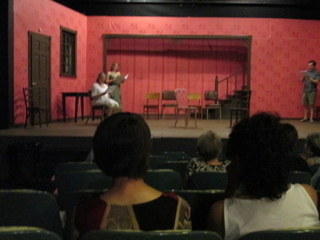 I’m not the sharpest knife in the drawer, but even I know that putting sex and violence into your content is the sure way to become popular. But because I’m not the sharpest knife in the drawer I don’t do that. Not usually. Sometimes people think I do, but I don’t. That doesn’t even make sense, does it? Either it’s there or it’s not there. Either there’s liftoff or Houston we got a problem. It’s been scientifically proven: you cannot be just a little bit pregnant. But I beg to differ.
I’m not the sharpest knife in the drawer, but even I know that putting sex and violence into your content is the sure way to become popular. But because I’m not the sharpest knife in the drawer I don’t do that. Not usually. Sometimes people think I do, but I don’t. That doesn’t even make sense, does it? Either it’s there or it’s not there. Either there’s liftoff or Houston we got a problem. It’s been scientifically proven: you cannot be just a little bit pregnant. But I beg to differ.
I’ll show you what I mean. This past weekend I hosted a playwrighting workshop in my hometown. I write fiction, my fourth novel is coming out in August, blah, blah. You’ve heard all that before. But I’m taking a break to write strictly dialogue—my favorite part of any story. Let’s not go into the arrogance of thinking I can simply dash off a few he saids/she saids and call it a play. The point is, I had one of my first attempts at this artform critiqued this past weekend.
The result? I was duly reminded of the arrogance of passing off a few pages of conversation as a play. I was rebuffed, rebuked, chided, scoffed at, humiliated, crucified, immolated, flayed alive, and drawn and quartered. Finally I was requested to leave the theater. Fortunately I’m a masochist and enjoy that sort of thing. There’s nothing quite like having your intestines boiled before your own eyes first thing in the morning.
I limped home, enjoying my pain. Then the night closed in. The curtains on the outside world were drawn, leaving me to my own sordid thoughts. Before I knew it, it was two a.m., the thinking hour. I tossed and turned, haunted by one particularly acidic comment. It kept replaying in my head, even as I couldn’t get my head around it: it did not compute.
The comment came from an angry man who stood up and stated, “there’s one thing in your play that had no business being there. This thing did not further the action. It did not contribute a thing. I’m talking about the hard-on. It had no business being there.”
I nodded my head and muttered something about it probably had been put there by somebody to say something about the character’s character. Or maybe the dynamics of the marriage. In my own head I was writing off the old sourpuss as a prude, a Podunk morality pusher that didn’t like anything racier than Disney.
But that didn’t make sense and that’s why I couldn’t get to sleep. There was a cognitive dissonance rolling around in my brain. See, the play opens with the married couple completely in the nude, and that hadn’t bothered the guy. It wasn’t the sex at all. He just felt the hard-on was misplaced. He felt it didn’t need to be in a play about environmental disasters. In his mind, I was just trying to shove in a little sex or violence to get the numbers up.
As if!
Then I realized why I was rolling around, punching the pillow at two a.m.: there was no hard-on in the play! There was a one liner that used the word “hard-on,” but that was it. Using a word in a conversation is a very different thing than actually putting what the word describes on the stage.
At about 2:15 I finally realized that the guy simply didn’t get the joke. It was a throwaway line not meant to further the action but to illustrate a character’s character or maybe portray the dynamics of the couple’s marriage.
So the problem wasn’t that a hard-on doesn’t belong in the play, but that the set up for the joke was weak and ineffectual. Maybe the dialog was too choppy. Whatever, the guy missed the joke. Can it be fixed? I hope so, but I don’t know. You tell me. Here’s the lines pulled out of context. What do you think? Do you get it? What’s wrong with it?
DEAL
(off stage)
Big news, Jackie, baby! Big news!
JACKIE
(sarcastically) Don’t tell me: a million gallon spill of flesh-eating bacteria off the coast of Jersey. Thousands of faceless victims flooding area hospitals. Summer trade threatened.
(DEAL returns from the closet with his shorts on. He walks to the mirror and inspects his face one last time.)
DEAL
(serious)
Not that big. Not that big.
JACKIE
(rises, grabs the robe, and heads to closet)
Careful dear, you’re getting a hard-on.
That’s it. There’s the joke. The line. Do you get it that he’s not really getting a hard-on, that he’s just excited about a huge environmental disaster? And Jackie is making a statement about him?
Anyway, you can see how sex can be there even when it’s not there. Sex is in the mind of the beholder, I guess. Sad thing is that far from removing what offended this critiquer, I’m going to leave it in. Try to give it a prominence in fact. Because nothing sells content like sex.
Sue Lange


June 2, 2013
Win a Free Copy of The Perpetual Motion Club
 Good reads is running a contest from now until The Perpetual Motion Club will be published in August. They’re giving away a free copy of the book to five lucky people. For information visit the book’s page at Goodreads.
Good reads is running a contest from now until The Perpetual Motion Club will be published in August. They’re giving away a free copy of the book to five lucky people. For information visit the book’s page at Goodreads.


May 28, 2013
It’s the Little Things: A Trip to the Dump
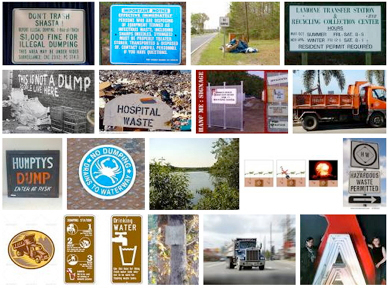 I had an old couch and a futon that had been in storage in the barn for a couple of years. These things had been with me for years but not really part of my life. A barn allows for the storage of too many things that are hard to throw out even if they feature unfortunate polyester upholstery in a mustard plaid pattern not even my mother would love. Out in the barn these pieces had accumulated an impressive coating of swallow droppings. The stuffing had rotted to a wonderful mushiness, perfect for the local population of mice. I had to face the fact that these items no longer deserved a place in my heart, let alone my home.
I had an old couch and a futon that had been in storage in the barn for a couple of years. These things had been with me for years but not really part of my life. A barn allows for the storage of too many things that are hard to throw out even if they feature unfortunate polyester upholstery in a mustard plaid pattern not even my mother would love. Out in the barn these pieces had accumulated an impressive coating of swallow droppings. The stuffing had rotted to a wonderful mushiness, perfect for the local population of mice. I had to face the fact that these items no longer deserved a place in my heart, let alone my home.
It is not easy to dispose of unwieldy garbage where I live. I don’t have trash pickup because out here we simply burn everything. Unfortunately mattresses don’t ignite easily. They usually just smolder like a peat bog for thousands of years and that sort of thing plays hell with property values.
The suburban method of furniture disposal, i.e. depositing on a curb with a “free to good home” sign, doesn’t work here either. We’re in the Twilight Zone and by that I mean the cornfield episode. Most people driving around the countryside here have no idea how they got here or how to get home. They’re frustrated, angry, and in no mood for charming castaways tossed to the front lawn. They don’t don’t understand how good that piece would look between the corner curio cabinet and the punched-tin pie safe. My discarded furniture would sit around for months getting soggier and soggier. It would end up creating discord between me and the local farmers. And oh how I hate pissing off anybody handy with a pitchfork.
<!–more–>
So, to the dump.
My, how that experience has changed! When I was a kid, going to the dump was a Saturday afternoon outing for the whole family. It was our version of a trip to the IMAX. Only it was cheaper and there was something for everyone.
My scat-loving younger brother found the stench an endless source of entertainment. He pulled out every second grade fart joke in his arsenal as soon as we rounded the last corner before the gate. He’d keep it up over the course of the two-hour visit. When he finished the repertoire he’d start over again with What-did-one-burp-say-to-the-other-burp? If he got bored he’d practice his armpit flapping noises.
My mom’s a bird watcher, so she’d bring along her binocks and while away the time identifying the various species of buzzard and gull.
My dad, on the other hand is a talker, the type of person always on the lookout for fresh meat he can regale with war stories. He never saw any action; wasn’t even in any branch of the armed forces. However he was a high school teacher. ‘nuff said, right? Back then the dump always had a couple of bums living in tarpaper shacks with tin can chimneys. They’d have all-day rubber tire fires going outside for cooking and entertainment. If they were facing the wrong way when Dad’s Buick drove up they were out of luck. No chance to make a break before the old man sidled up with the latest hot gossip from the faculty room or anecdote about the school board members’ shenanigans with this year’s contract.
My older brother and I scouted for two-cent deposit bottles. We were quite the entrepreneurs and could support our hefty comic book addiction with what we found at the dump. This was before the bag ladies cornered the market on bottle returns. I can’t imagine what modern pre-teens with monkeys on their back do for cash flow now.
Dumps are no longer the IMAX of the 50s and 60s. It’s big business now: industrialized, corporate even. And that reassuring smell of gagging putrefaction is gone. It’s just not the same. If you go for old-time’s sake anyway, you’ll pay a hefty fee for your reminiscence: $68/ton. $68 being the minimum. You might only have a bag of old pampers and a used Kleenex or two, but you are still paying $68.
My old couches were not close to a ton, so I filled my truck with as much stuff as I could stuff: old cracked windows (which are by far the hardest thing to recycle–there are only so many people building coldframes), rubber tires (the classic dump item), crates of broken glass, ripped up tarps, moldy carpeting (again mustard plaid), and an empty 55-gallon drum (don’t ask).
The guy at the guard shack looked at the contents of my little truck (Chevy 1500, 4×4) and shook his head. He saw before him a scrawny little girl who would never get those couches and that damn barrel up and over the side of the dumpsters reserved for lay people on this side of the gate. He searched his conscience, thought about the easy $68 he was about to acquire, and took a chance: he granted me dispensation to enter the dump proper and use the special roll-off on the other side of the hill. “It’s by a ledge you can drive up to so you won’t have to lift anything. Just push your load off your, what is that little thing? One of those Jap makes? Where’d you get that? I didn’t know they imported those things.” I drove off while he was still laughing.
I didn’t think anything of it until I’d actually breached the gate beyond the guard shack. There I entered a netherworld, a secret place no one knows exists. It’s filled with gargantuan monsters doing magical, dark things. There wasn’t a sign there that said “Abandon all hope, ye who enter here,” but there was this: “No one permitted beyond this point without a hard hat.” You see what I’m getting at. Gaining permission to use the roll-off in the back was a statement. I was a special person, privileged as only those with a keen mind and stringy upper body are. I was honored. I was humbled. I was entering the dump without a hard hat.
I almost got lost before I found the roll-off next to the cliff. There were many side lanes that led into deep valleys between huge treacherous mounds of earth that no doubt hosted hidden crevasses that would eat you alive if you ventured off the path. The man had said I just needed to follow the Jersey barriers around to the right and over the rutted, gravel road (“but your little…whatever… will be okay as long as you don’t hit any of the half-buried rebar encased in concrete, heh heh”), back onto the macadam, and then around to the cliff. On the other side of that is the roll-off. “Just back your little import up to the ledge and you can push your stuff over the precipice and you’ll be fine.” Because the instructions were so lengthy by the time he got to the end I forgot to ask him what a Jersey barrier was. About five seconds beyond the entrance I remembered that little point. Too late then. You know the rules about going to places you don’t belong: Don’t Turn Back; You Don’t Get a Second Chance.
Did I mention the modern dump is industrialized now? It’s no longer Alice’s Restaurant Massacree in four-part harmony. The place is crawling with Cats— huge tank sized front end loaders, back shovelers, bulldozers, cherry pickers, and fork lifts, all painted in Caterpillar yellow. They ran around and over the mounds like ants working a hill. They pushed massive amounts of dirt over ecologically perfect layers of composting trash, ensuring the neighbors’ ground waters remained safe and EPA-passable. No idea why that was important; there were no neighbors for miles around.
Except for that one cranky old guy that is. When they upgraded this dump years ago, the first thing they did was kick the tramps out. One irascible man wasn’t having it. He had no teeth but kept threatening them with a rusty Smith & Wesson that probably didn’t work but would have created havoc with the dump’s image. A dump in the neighborhood is already a hard sell; no sense making it worse. No sense in attracting attention. So they eminently domained the one house on the perimeter and gave it to the old guy. He lives there now with hubcaps on his walls and a killer collection of discarded cabbage patch kids.
I eventually found the roll-off in the back, made my dump, and wended back around to the guard shack by following what I assumed to be the fabled Jersey barriers. The man weighed the truck, gave me a bill for $68, and took my credit card. I asked him why the dump didn’t stink anymore. He had a complicated answer about their high-tech ambient analyzing system. At intervals during the day, it took air samples at various spots and analyzed the chemical content. It then compared the results to wind speed and direction, humidity, and barometric pressure. If the numbers were right (and Mars was retrograding, I suppose) the system would emit a fair amount of nasal soothant into the area. It negates any dump stench present and keeps the non-existent neighbors (except for that one old guy who has no sense capability left anyway) from calling in the media or initiating a law suit.
In the end the dump visit was satisfying. It’s exhilarating climbing up a good size dump mound. You get a nice chunk of altitude up there. It’s windy and the view is fantastic. I found myself really enjoying the day. The thin air might have had something to do with that. Whatever, it got me in a nostalgic mood. It may not have been as good as Saturdays back in the 60s, but there’s a lot to be said for a good dose of nasal soothant when the atmosphere is rare.
This essay was first posted at the Book View Cafe blog on May 8, 2013.


May 26, 2013
Vonnegut Tribute Anthology is Out
 The Kurt Vonnegut tribute anthology, So it Goes, mentioned in a previous post has been launched. It’s been out about a month and I’m just now remembering to post a notice about it. At any rate. It’s out now and you can order your copy from Amazon or B&N or Goodreads whichever is your book deliverer of choice. My story Megastar Hopper is in it. What’s more, there’s a podcast based on Megastar Hopper up at Youtube. Do try to consider making a trip to this content smorgasbord.
The Kurt Vonnegut tribute anthology, So it Goes, mentioned in a previous post has been launched. It’s been out about a month and I’m just now remembering to post a notice about it. At any rate. It’s out now and you can order your copy from Amazon or B&N or Goodreads whichever is your book deliverer of choice. My story Megastar Hopper is in it. What’s more, there’s a podcast based on Megastar Hopper up at Youtube. Do try to consider making a trip to this content smorgasbord.
Sue Lange


May 6, 2013
Where are the women of SF?
 Why are people focusing on this question so much lately? Is it some weak tie-in to women’s history month (March)? Does this happen every time spring rolls around? Or has something reached epidemic proportion and now it’s time to Do Something?
Why are people focusing on this question so much lately? Is it some weak tie-in to women’s history month (March)? Does this happen every time spring rolls around? Or has something reached epidemic proportion and now it’s time to Do Something?
I don’t know but there does seem to be a rash of blog posts on the subject. There’s this. And then there’s this. And finally there’s this. Regardless, as Kathi Kimbriel pointed out on Facebook (I would include the link but I’ll be damend if I can figure out how to find anything at Facebook) the answer is: we’re here at Book View Cafe; can’t help it if no one is bothering to look. (For those who don’t know I’m a member of Book View Cafe although I don’t spend as much time over there as I should.)
Perhaps the larger question and the one the Strange Horizons post seemed to be asking is why aren’t the women being reviewed? Which actually translates to: why isn’t women’s writing being taken seriously? I’ll let the academics, the people that study science fiction, answer that. They’re the ones falling down on the job.
Meantime another question that has more relevance is: where are the female space heroes? One answer is that people don’t seem to like ‘em. When I workshopped my story, “Mission of Greed,” before submitting it to The Other Half of the Sky anthology (mandated to contain only stories of women space heroes) one comment was: “I can’t see a woman being in this position.” Basically my hero was a captain on a space faring vessel. Not much of a stretch after Captain Janeway.
Now it might have been more complicated than that. Maybe it was because my captain had hidden a tiny weapon in her commode and the only way she could get to it secretly was to pee in public so everyone would turn their backs. I’m not sure I would have the balls for that either, so maybe my co-workshop-participant was right. That might not be womanly behavior. But I don’t think that’s it. I just think people are uncomfortable having women in command. And the only way you can be a space hero is to take command. Either be assigned a leadership role through the story’s invented hierarchical structure, or usurp the ineffectual deadbeat sitting on the throne. However it happens people are uncomfortable with a female leader.
Which leads to the wider world from which the problem stems. Not with literature, writers, reviewers, and publishers, but with ourselves and our culture. As pointed out in 2011’s Sundance Film entry, “Miss Representation,” female leaders in our culture/country (Western/US) are bashed, abused, unrecognized, beaten down, or just plain ignored more so than their male counterparts. (Watch the trailer for this most excellent documentary.) You can believe this just from your own witnessing of Internet behavior. Women’s voices and opinions are scoffed at relentlessly, even if they amount to the same things coming from some guy.
Out in the traditional media, this situation is more dangerous than here in Internetworld. Out there opinion has an ungodly reach. And it’s respected more than a random face slap on a blog. It’s as if because Rush Limbaugh gets time and space on the air every day, he’s much closer to God and therefore the truth.
So in our culture, women heading up a surveillance operation, an undercover spy mission, a seek and destroy, a reconnaissance foray, or military maneuver usually go undocumented, glorified, noticed, or praised in public. Even though these things are going on all over the place. These women are either invisible or spat upon. How then can the public react when they read space opera run by women? That uneasy, queasy feeling creeps in and pretty soon our reader is all sweaty and itchy. They’re just not comfortable.
Fortunately our heroines just keep on keepin’ on any ol’ way, anyway. They do not have time to stop and ponder the consequences of their actions. They’ve got to deliver the ammo, hunt down the predator, kickbox the alien, kill the enemy at the door, find the closest pitstop because the antimatter drive is getting cranky and we’ve got a Vogon on our tail. And as long as our heroines keep on, us authors are going to keep on writing about them keepin’ on. So roll over Beethoven, cowboy the heck up and take the e-news like a man. There’s a new sheriff in town and she don’t need no balls. That’s how effing tough she is.
For a good dose of female space leadership check out The Other Half of the Sky. Here’s what a few people have been saying about it:
Library Journal: “Freed from many of the male-oriented clichés, the selections present vividly depicted male and female, human and alien characters as fully fleshed individuals coping with a wide variety of issues.”
Publishers Weekly: “Space opera aficionados of all persuasions will enjoy these and the other stronger inclusions.”
Sue Lange
This essay was first posted at the Book View Cafe blog on April 29th.


April 24, 2013
My Theme Song
Everyone has a theme song that will, upon their death, be playing as they enter the pearly gates. Milt Buckner’s “The Beast” is mine.
Here’s the tune:
When I meet St. Peter, I’ll be playing my flute along with Milt. We’ll raise a little hell. What’s your theme song?


April 22, 2013
Manifesto
 D’ya ever wonder why modern bloggers have to specialize on some topic but Andy Rooney could rant on any subject he took a fancy to? Why is that? And are we better off staying focused on whatever we thought we were all about when we first set up the “About Me?”
D’ya ever wonder why modern bloggers have to specialize on some topic but Andy Rooney could rant on any subject he took a fancy to? Why is that? And are we better off staying focused on whatever we thought we were all about when we first set up the “About Me?”
I don’t know, but I feel like this whole numbers thing—this chasing after stats and ranking and readership—is just another way for The Man to keep us down. I’m not a one-dimensional person. I like lots of things.
Readership be damned, I’m taking this opportunity to declare my independence of all Internet Best Practices. From here on out I’m going to generalize. My blog will no longer have a purpose, a focus, or primary topic. I’m going to write about anything I happen to trip over. The wider world is begging to be satirized and I’m just the man for the job.
I started this thing to explore the Technological Singularity but I’ve long since left that behind. The Singularity’s a cool topic, but I’ve milked it for what it’s worth. There are better Singularity reporters out there if you need to watch the progress. The cheerleaders, the cynics, they’re all on top of the story. Me? I’m just passing through on my way to the next thing, whether it’s cyberhood or a cardboard hovel under the 59th Street Bridge. I view the Singularity the same way I view the Second Coming: when and if it happens, I’ll wring my hands at my shortsightedness, but until then, I’d like to think about other things. Like shoes and ships perhaps. And, and sealing wax! Cabbages, of course, can’t forget cabbages. Someday I may even contemplate kings.
With such atheistic blurriness, I’ll probably never get a readership. According to the rules of Internet marketing, you must stay focused. Otherwise you will not be loved. Ah well, won’t be the first time I’ve heard a hollow echo when tapping on the mic and asking “hello, hello, anybody out there?” That’s okay. There’s a lot to be said for solitude.
So I’ll survive.
Here’s another thing. I’m done with branding myself. What am I, a heifer? From here on out I declare myself free of all marketing impulse. What you see is what you get. I’ll write about my books and stories from time to time, but I’ll be honest, I find self-promotion an egregious breaking of the first rule of outstanding existence: don’t be boring. People whose only topic of conversation is their output are the ultimate in tedious. Yes, I know all us writers are supposed to bring up our books in every conversation at every cocktail party from Memphis to LA, but really, life’s too short to muck around in that amount of bullshit. I became a writer in the first place to lampoon our crass commercial culture. Now I’m on board with it? I don’t think so.
So bear with me as I march down a purposeless path. Don’t be scared. Andy Rooney’s already blazed a trail. And he wound up with a top spot at CBS. God, what I couldn’t do with that kind of visibility. Imagine his Klout score. I’d kill for that kind of…nevermind.


Sue Lange's Blog
- Sue Lange's profile
- 19 followers


